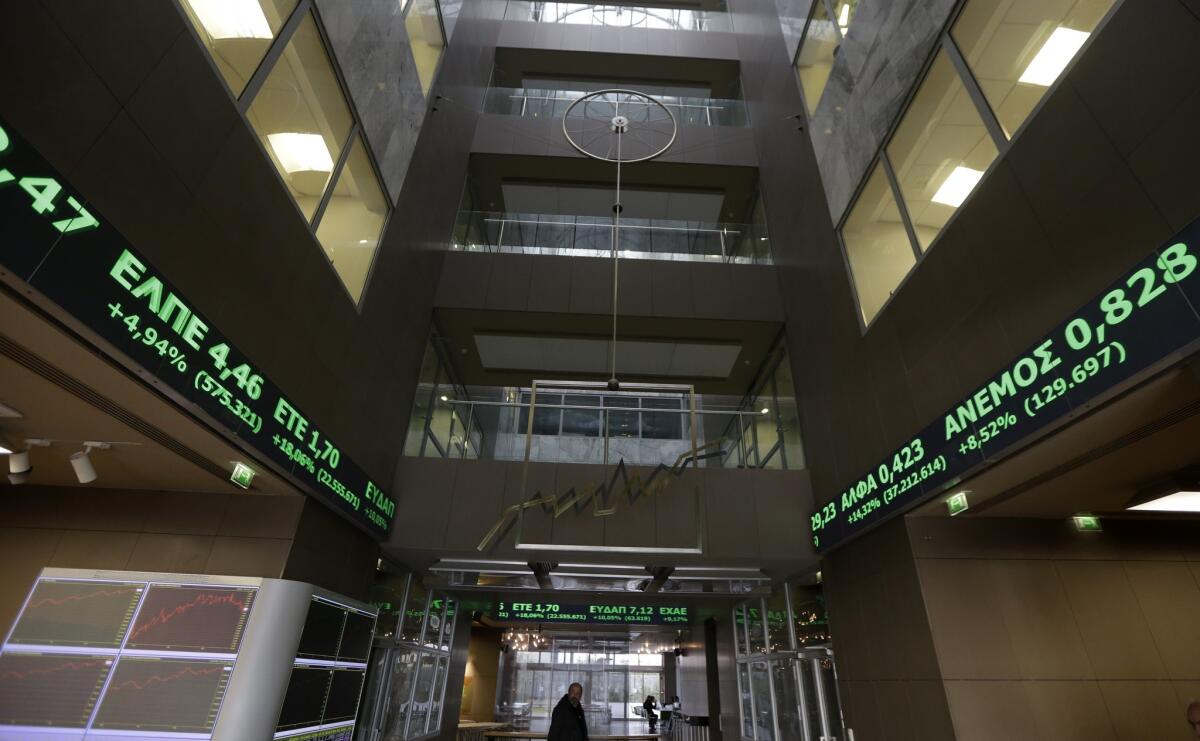Eurozone backs Greek reforms; key hurdle to extend bailout

- Share via
Greece’s creditors in the 19-country eurozone on Tuesday approved a list of reforms Athens proposed to get a 4-month extension to its bailout, which should keep the country afloat over the coming months.
An encouraging reaction from the so-called institutions — the European Commission, European Central Bank and International Monetary Fund — to the reforms Greece proposed in a letter late Monday was backed by the eurozone nations.
Greece had to make the proposals in order to get the bailout extended. Without the financial lifeline over the coming few months, Greece faces the possibility of going bankrupt, imposing capital controls and ditching the euro.
“The three institutions agreed to start the process with this. They thought it was a serious enough list and all the countries have just agreed with that in the meeting so we can start,” said eurogroup president Jeroen Dijsselbloem on RTL television.
The proposal to extend Greece’s bailout, which ends at the end of the month, now goes to some member nations for approval.
The reform plans, which include measures to deal with tax evasion and corruption and were sent just ahead of Monday’s deadline, also met with a favorable response in the markets. The main stock market in Athens was up around 9.8% in late afternoon trading.
Though the reform measures were welcomed, the eurozone ministers said Greece had to take further steps to flesh out the details.
“We call on the Greek authorities to further develop and broaden the list of reform measure,” the eurozone said in a statement.
Dijsselbloem also urged Greece to move quickly, pointing out that the reform program needs to be updated and implemented within four months.
The IMF was most downcast of all, insisting that the vague promises in Tuesday’s list now needed to be turned into real action.
In a letter to Dijsselbloem, IMF managing director Christine Lagarde said that in many key areas, the list “is not conveying clear assurances that the government intends to undertake the reforms envisaged.”
Lagarde specified there were no “clear commitments to design and implement” VAT and pension policy reforms, or “unequivocal undertakings” to continue previously agreed policies to open up closed sectors, on administrative reforms, privatization and labor market reforms.
In its list of reforms, the Greek government says it will combat tax evasion and corruption, reduce bureaucracy, review public spending, modernize the pension system, reform the judicial system and address rising poverty through measures that have “no fiscal effect.” It says authorities will “turn the fight against corruption into a national priority.”
It pledges not to roll back any privatizations that have already been completed and to “respect the process, according to the law,” of any tenders that have already been launched. Privatization was one of the elements of Greece’s bailout that Tsipras’ Syriza party had promised to cancel.
The letter is a general outline of policies and does not include any figures or specific details on how the policies will be achieved.
Moscovici said he would work “with the new administration to elaborate what are at the moment still general commitments and transform these into clear policy actions.”
More to Read
Inside the business of entertainment
The Wide Shot brings you news, analysis and insights on everything from streaming wars to production — and what it all means for the future.
You may occasionally receive promotional content from the Los Angeles Times.









